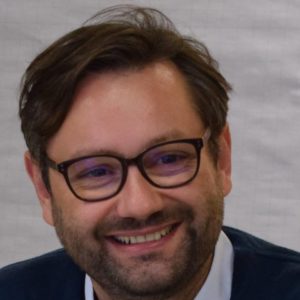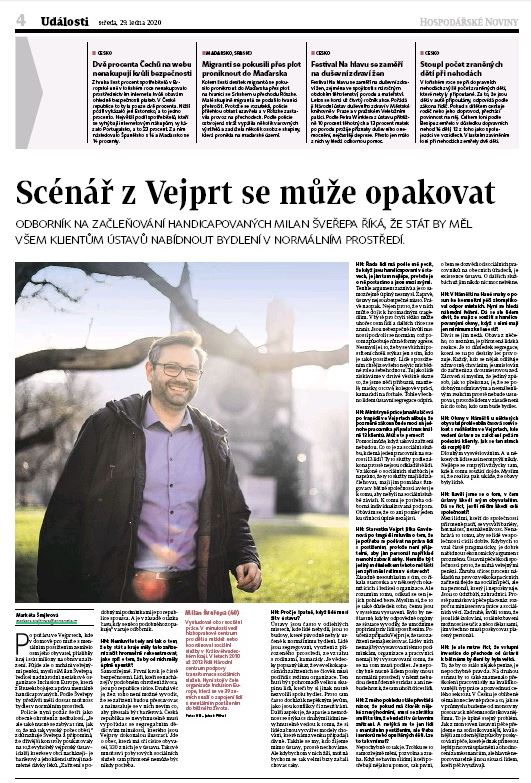A blog post by Milan Šveřepa.
8 men with intellectual disabilities were killed by fire in a “care home” in Czechia. Following the tragedy, I was interviewed for Czech business newspaper Hospodářské noviny. Edited excerpts:

Inclusion Europe’s director Milan Šveřepa
It is necessary for the investigation to answer why the number of victims is so high. There were quality inspections in recent years in this “care home” and others by the same provider that found inaccessible buildings being used for people who have reduced mobility, as well as over-medication of residents.
There are many other places like this in Czechia. It is only a matter of time before such tragedy is repeated.
You are calling on the Czech authorities not to start the reconstruction of the “care home”, but to replace them altogether.
Of course. There are very important safety reasons. There are thousands of people in Czechia living in similar danger to their lives. But it does not mean that this will be resolved with the installation of some fire sensors or other safety equipment.
Czechia must finally deal with its heritage of segregation, which is illustrated by this “care home” in Vejprty. Vejprty is a small town with 3,000 inhabitants – and 330 of them live in “care” institutions! You’ll never need such high number of residential services only for the people from the area.
Why is it wrong when people have to live in an institution?
Institutions are often in remote, isolated locations. In places where nobody else lives, in building not designed originally as normal residence.
People living inside these institutions are segregated, taken away from their community, from their family and friends.
It was described by scientists long time ago that in these high-capacity institutions people must submit to the rules of the institution. They are forced to live together with a large group of people they would otherwise not choose to spend their lives with.
Institutions are often places where many ugly things happen – conflicts, violence, abuse.
Another aspect why institutions are not good for people to live in is the apathy and inability to socialize with other people. This leads people living there to develop behaviours which seem strange, even weird, to anyone from the outside. This is how those outside of the institution do not behave; but they would soon behave this way too, if placed into the institution.
Institutions are dangerous
Many people think that institutions are good for people with disabilities because they are safe there and they live among other people like them.
This is often said – and it is of course completely nonsense. Institutions are no safe place. On the contrary, they are not safe, as Vejprty have tragically demonstrated: it would be hardly possible for 8 people to die and 30 others to be injured in an apartment for four.
But institutions are dangerous also because people living inside them submit to the rules and pressures of the institution. This causes various forms of aggression.
The claim that people with intellectual disabilities would want to live only with other people with intellectual disabilities is also not true. What they want the most is social roles and self-esteem. We usually get that through interactions with other people, by being relatives, husbands, mothers, fathers, colleagues at work, mates at football. And people in institutions are denied all of that.
The mayor of Vejprty said after the tragedy that there needs to be a review of the rights of people with disabilities, because for example staff cannot seize their matches. Can the tragedy lead to tighter regimes in institutions?
I fundamentally disagree with what the mayor said. It would be unacceptable if the authorities conclude that in response they must deny people with disabilities even more rights.
The major lesson from this tragedy is that these institutions should not exist.
Some efforts to move people from institutions to community care have been hampered by local resistance. Can it be because the general public has minimum experience in actually living together with people with disabilities?
Undoubtably so. It is another result of the segregation which has been here for several decades. Everyone somehow different is being placed in an institution behind a two-meters high wall.
The only way to overcome this situation is to end segregation and show in practice that living together is not only possible, but absolutely normal.
The locals often complain about the fact that they don’t have enough information. Shouldn’t the authorities inform them better?
This is a difficult question. On the one hand, I believe it is none of the locals’ business. When you decide to buy a house somewhere, you don’t go around two years in advance explaining this and asking future neighbours for permission.
On the other hand, it is necessary to be explaining these changes. After all the years of segregation there are certainly preconceptions people have. It is important to explain that the people living in institutions are there not because they are “dangerous” or because they did something bad.

Print newspaper page with the interview
Institutional “care” is a waste of public money
We talked about institutions being harmful to their residents. But do they have negative effects also on society as a whole?
Institutional segregation creates barriers, ignorance and intolerance between people who are natural parts of society. It does not contribute to making people feel good in the society.
There is also a pragmatic, economic argument for change. Institutional “care” is a waste of public money. Roughly 30% of the money spent on “care” institutions does not go to actual “care”. It is spent on staff who is responsible for maintenance of the buildings and their surroundings.
And because people living in institutions have no informal relations and are not allowed to learn and take care of their lives themselves, everything must be provided by a paid staff. Once people move out of institutions, very soon they have someone (a friend, a neighbour) who can help them with ordinary daily tasks. Just like all of us do.
Read the full interview in Czech here. Cover photo credit: Jakub Plíhal, Aktuálně.cz
This interview was published after 8 men with intellectual disabilities were killed by fire in “care home” in Czechia. Read Inclusion Europe reaction to the tragedy.
Read another interview I gave just before the tragedy.
Read more from our blog.





